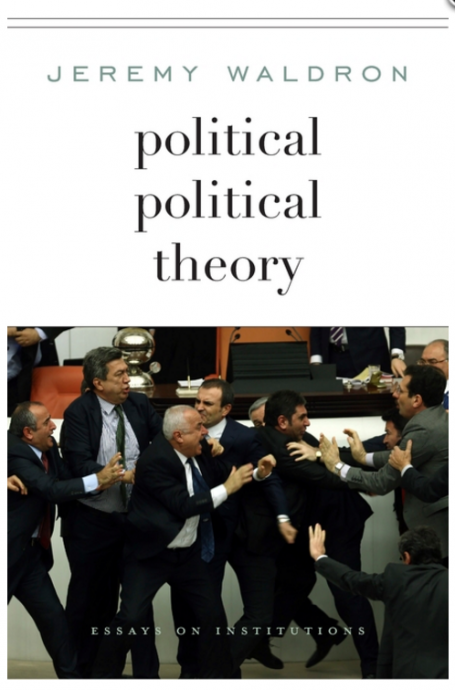We are living in a society in which tastemakers are far more likely to offer hollow cries for justice than they are to recognize artistic endeavors.
Libertarianism: Just As Feasible As the Rest (and Just As Fragile)
Michael Munger’s Liberty Forum essay presents a strong commentary on libertarianism as a governing philosophy. He addresses the question by drawing a distinction between the libertarians who are “destinationalist” and those who are “directionalist.” The former adhere strictly to the two pillars of libertarianism (the self-ownership principle and the non-aggression principle). The latter see as desirable “any policy action that increases the liberty and welfare of individuals”—even if the policy is not libertarian.
He concludes that a destinationalist libertarianism faithful to the two fundamental principles “could not be an effective governing philosophy.” However, he encourages us to remain aspirational destinationalists, and pragmatic directionalists. I agree with his conclusion.
Where does this leave us? First, I have two doubts about the very question posed in this symposium, “Can Libertarianism Be a Governing Philosophy?” Second, I have four small quibbles with Munger’s argument.
Yes, of Course
On the question itself: It is important, and Munger’s treatment of it is insightful. However, it lends itself to problematic answers.
My first doubt leads me to say: “Yes, of course—because it’s already everywhere.”
While governments routinely encroach on individual rights, many aspects of daily life are left to voluntary interactions. Without getting into the anarchy-versus-minarchy dispute here (as the lessons are applicable to both), I turn to John Hasnas’s convincing thesis of “the obviousness of anarchy.”[1]
Hasnas explains his task: “I have been asked to present an argument for anarchy. This is an absurdly easy thing to do. In fact, it is a task that can be discharged in two words—look around.” He then proceeds to list example after example of non-governmental provision of public goods: the common law and private arbitration; police forces in major U.S. cities that were not state-run until the mid-19th century (to which I would add security in the United States today, up to three quarters of which is privately provided[2]); private provision of health, life, and retirement insurance (which worked quite nicely until the New Deal busybodies shut them down in favor of one-size-fits-all government programs[3]); or tort law, which provides a libertarian implementation of the self-ownership and non-aggression principles, without the clunkiness and arbitrariness of regulatory or statutory approaches.
With glaring exceptions (such as slavery and some very unlibertarian language about regime preservation), the U.S. constitutional order until the Civil War was largely libertarian.[4] Freedom is fragile and ephemeral; that much is certain. But constitutionally constrained, largely libertarian governments have existed throughout history, if imperfectly (perhaps we could call them directional, rather than destinational).[5]
My second doubt could be put this way: “Why focus on libertarianism, when the question can be asked of all governing philosophies?”
It seems in a sense unfair to single out libertarianism since all governments fail, if only by Munger’s criteria (not devolving into autocracy or anarchy). This is nothing new. Some 25 centuries ago, Aristotle was already worried about regime preservation and safeguards against autocracy and anarchy.[6] Thomas Jefferson famously wrote that “the natural progress of things is for the government to gain ground and for liberty to yield.” And the whole science of politics involves a prudential balance between anarchy and leviathan, to paraphrase James M. Buchanan.[7]
This applies to the preservation of liberty, but also to regimes for which liberty is secondary—whether a Marxist utopia lapsing into the totalitarianism of the Gulag, or France’s waltz of 21 constitutional regimes between 1789 and 1958. All regimes are dynamic and all eventually fail on their own terms. Eternal vigilance has always been the price of liberty, and it will always be.
These (admittedly) flippant answers notwithstanding, the fundamental question does still apply, because we must constantly make the case for liberty. In the words of F.A. Hayek, it still remains for us
to offer a new [classical] liberal programme which appeals to the imagination. We must make the building of a free society once more an intellectual adventure, a deed of courage. What we lack is a liberal utopia, a programme which seems neither a mere defence of things as they are nor a diluted kind of socialism, but a truly liberal radicalism which does not spare the susceptibilities of the mighty.[8]
Non-aggression, ad absurdum
Now for my quibbles. The first is that Munger points to a potentially fatal flaw in the non-aggression principle, using the thought exercise of a fall from a 50th floor balcony that is broken by a (privately owned) flagpole on the 49th floor. He rightly points out that “if we take support for the non-aggression principle as a Rorschach test, it does not appear that most people, maybe not even everyone who identifies as a ‘libertarian,’ are fully convinced that the principle is an absolute categorical moral principle.” Indeed, a vast majority of poll respondents would gladly violate the property rights of the flagpole holder, entering the domicile against the owner’s wishes, rather than tumbling 49 stories to a certain death or waiting for assistance.
Fortunately, this is not a fatal flaw in libertarianism as a governing philosophy.
Take, for example, Ayn Rand—surely not a lady for turning in her uncompromising defense of individual rights. In her essay on “The Ethics of Emergencies,” Rand makes a case for helping strangers in emergencies. Of course, she carefully explains that “it is important to differentiate between the rules of conduct in an emergency situation and the rules of conduct in the normal conditions of human existence.” She precisely explains that “it is only in emergency situations that one should volunteer to help strangers if it is in one’s power.” Surely allowing onetime safe passage from a 49th floor flagpole, through a private residence to a safe exit, would qualify. What is more, such exceptions do not destroy the non-aggression principle. In fact, Rand concludes, once the emergency is ended, “one’s sole obligation to others . . . is to maintain a social system that leaves men free to achieve, to gain and to keep their values”—in other words, to respect the principles of self-ownership and non-aggression.[9]
Beyond philosophy, the temporary suspension of otherwise robust property rights in emergency situations has been recognized by the common law.[10] One does not lose one’s libertarian card, nor does libertarianism unravel, if one allows for emergency exceptions. Thus I agree with Munger that “a destinationalist libertarianism that is fully faithful to the self-ownership principle and the non-aggression principle could not be an effective governing philosophy.” But it does not need to be fully faithful.
Forcing Libertarianism? Or Forcing Respect for Rights?
My second quibble has to do with Munger’s ruling out of “involuntary imposition by force of libertarianism as a governing philosophy.” Here we face a cognitive disconnect, as most people seem to want the world to operate under a double standard of morality: libertarianism for me, interventionism for everybody else. Everybody screams bloody murder at any perceived violation of rights—while also voting for redistribution and intervention. For a libertarian, it is perfectly consistent to impose (by force, if necessary) the protection of self-ownership and non-aggression. It follows, then, that it is consistent to impose libertarianism as a governing philosophy—if by libertarianism, we simply mean respect for the self-ownership and the non-aggression principle. If people don’t want it, they are welcome to make voluntary donations or join private associations that require involuntary donations. But rejecting libertarianism does not give anybody carte blanche to violate the rights of others.
The Common Good, Properly Understood
Munger teases out two scenarios for the preservation of a minarchist constitutional order. If (following standard Public Choice assumptions) political agents are narrowly self-interested, they will need to be “[bound] down from mischief by the chains of the Constitution,” as Jefferson presciently wrote. And if politicians and bureaucrats “genuinely want to improve the lives of their citizens,” as Munger writes, there will also be movement away from liberty. He says that political agents, “thinking of the society as a collective rather than as individuals with inviolable rights, will immediately discover opportunities to raise taxes, and create new programs and new powers that benefit those in need.” But that is simply another reason to tighten the constitutional chains.
What is more, these political agents are hubristically misguided, suffering from what F.A. Hayek called “the fatal conceit.”[11] Indeed, as Hayek demonstrated in that eponymous book and in a half-century corpus, policymakers do not and cannot have sufficient knowledge to run the world better than the spontaneous forces of the market and civil society. Quite the contrary, they are apt to cause terrible damage.[12] Instead of hubris, we turn to Jason Brennan for a definition of the common good—which he defines with delicious narrowness as a combination of institutions—such as social order, shared ethical/social norms, rule of law, and markets—that are indeed to everyone’s advantage.[13]
In sum: Policymakers are either self-interested, or they think they’re acting in the common good, but they’re wrong. Either way, constitutional constraints are required. These constraints may be fragile, and freedom may be fragile—then again, every regime is dynamic and fragile, as described above. But this does not mean that the constitutional enterprise, or the libertarian experiment, is doomed to failure and not worth a serious, honest attempt.
Beyond the Contradictions of Contractarianism
With devastating effect, Munger deploys Anthony de Jasay against contractarian constraints to Leviathan. However, rather than attacking the weaknesses of contractarian approaches, we can go straight for the jugular, with Scott Gordon’s incisive words:
The contract theory of the state distorts more than it clarifies because its mistakes the essential problem of politics, which is to deal with the continuous, the complex, and the insoluble. The contractarian is a great simplifier who searches for discrete and final answers . . . But a civilized polity is not built on a contract. There never was a contract, there is no contract, and there cannot be a contract at the base of social life. Its only constant is change.[14]
The good news is that a contract theory of the state is not required, whether for constitutional maintenance or for a libertarian order—as soundly demonstrated by Hayek, Russell Hardin, and other theorists of constitutions as coordination mechanisms.[15] To be sure, as Munger points out, it certainly doesn’t hurt if people believe that the constitution is indeed a contract (just as a public orthodoxy of liberty will help slow constitutional drift). We can thus take issue with de Jasay’s conclusion that a constitution is “unnecessary (if people are self-governing)”—because pre-commitment devices help with even the best of intentions—or that a constitution is “ineffective (if they are not)—because the libertarian order, just like any order, is fragile and dynamic, but will benefit from speed bumps on the road to serfdom.
Conclusion
Again, there is little with which to take issue in Munger’s essay. With his framework of aspirational destinationalism and pragmatic directionalism, he leaves us with hope grounded in realism. Of course libertarianism is subject to constitutional mischief, just like any other constitutional order. But at least with a libertarian order (even if it doesn’t last), we will have had liberty for a while, and we will be more likely to remember that happy destination.
Eternal vigilance is the price of liberty. It does not follow that we should dismiss libertarianism because we fear it’s too difficult to reach, or too challenging to maintain.
[1] John Hasnas, “The Obviousness of Anarchy,” in Anarchism/Minarchism: Is a Government Part of a Free Country?, edited by R. Long and T. Machan (Burlington, VT: Ashgate Press, 2008).
[2] Bruce Benson, To Serve and Protect, Privatization and Community in Criminal Justice (New York University Press, 1998).
[3] David Beito, From Mutual Aid to the Welfare State: Fraternal Societies and Social Services, 1890-1967 (University of North Carolina Press, 2000).
[4] Jeffrey Rogers Hummel and William Marina, “Did the Constitution Betray the Revolution?”, The Independent Institute, 1981. See also Nathan W. Schlueter and Nikolai G. Wenzel, Selfish Libertarians and Socialist Conservatives?: Foundations of the Libertarian-Conservative Debate (Stanford University Press, 2017), chapter 3.
[5] Scott Gordon, Controlling the State: A History of Constitutionalism from Ancient Athens to Today (Harvard University Press, 1999).
[6] Aristotle, The Politics, Books IV and V, Cambridge Texts in the History of Political Thought, edited by S. Everson (Cambrdige University Press, 1996).
[7] James M. Buchanan, The Limits of Liberty: Between Anarchy and Leviathan, in The Collected Works of James M. Buchanan, Volume 7 (Indianapolis: Liberty Fund, 2000).
[8] F.A. Hayek, “The Intellectuals and Socialism,” University of Chicago Law Review 16 (Spring 1949).
[9] Ayn Rand, “The Ethics of Emergencies,” in The Virtue of Selfishness (Signet, 1964).
[10] Todd Zywicki, “Libertarianism, Law and Economics, and the Common Law,” Chapman Law Review, 16:2 (2013), 309-324.
[11] F.A. Hayek, The Fatal Conceit (University of Chicago Press, 1988).
[12] See, for example, F.A. Hayek’s The Road to Serfdom (University of Chicago Press, 1945); “The Use of Knowledge in Society,” American Economic Review, 35 (4): 519-30 (1945); or The Constitution of Liberty (University of Chicago Press, 1960).
[13] Jason Brennan, The Ethics of Voting (Princeton University Press, 2012), chapter 5.
[14] Scott Gordon, “The New Contractarians,” Journal of Political Economy 84:3 (1976), 573-590. See also Russell Hardin, “Constitutional Political Economy: Agreement on Rules,” British Journal of Political Science, 18 (October): 513-30 (1988); and David Hume, “Of the Original Contract,” in The Founders’ Constitution, edited by Philip Kurland and Ralph Lerner (University of Chicago Press, 1987), Volume 2, No. 4, p. 1752 http://press-pubs.uchicago.edu/founders/
[15] Hayek, Constitution of Liberty; Russell Hardin, Liberalism, Constitutionalism and Democracy (Oxford University Press, 1999). For an overview the contractarian versus emergent schools of constitutional theory, see Stefan Voigt, “Positive Constitutional Economics: A Survey,” Public Choice 90 (1997), 11-53.



